Published Aug 18, 2012
Trek Class Blog - Geek Girls and Star Trek
Trek Class Blog - Geek Girls and Star Trek
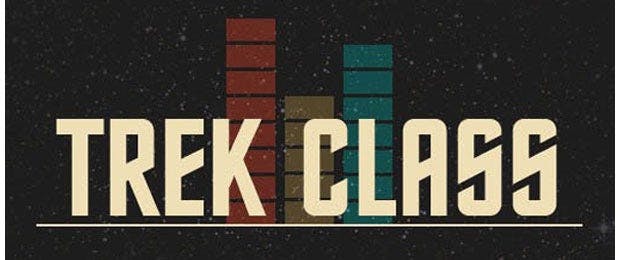
“Trek Class” is a course at Syracuse University’s School of Information Studies titled “Star Trek and the Information Age.” The course examines episodes of Star Trek series as a method of introducing concepts related to technology, society and leadership in our world. This post was written by Meghan Dornbrock, the Trek Class “First Officer.” Meghan graduated from the iSchool’s Library and Information Science program with a Master of Science degree and served as the teaching assistant for the class.
Anyone within 10 feet of the Internet over the last few months has surely caught wind of the Geek Girl debate that has reared up once again with overwhelming force. Specific incidents, such as the backlash Anita Sarkeesian faced with her Kickstarter, have gained major media attention, pulling this tired argument into the limelight once again.
The crux of the matter, whether we’re talking video games, science fiction, comic books, or any other stereotypically ‘male’ interests, is that women are depicted in ways that not only are usually impossible, but they’re stripped of the kind of agency so freely awarded to their male counterparts. Arguably these depictions foster a culture that has disrespectful or misguided views of women, and women feel alienated from interests they might otherwise want to pursue.
But then there’s Star Trek.
THE GENDER DIVIDE
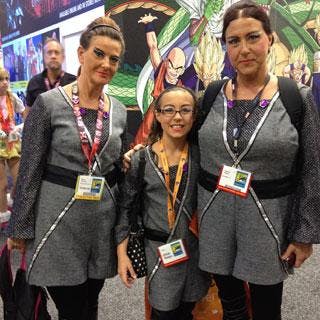
The most recent gender-breakdown, a statistic quoted by many from CBS at the convention last week, cites that viewership stands at 45% female and 55% male. (I found out that this doesn’t take into consideration Netflix data, because it isn’t available in a useful way, so the increasing online-viewership could change that statistic – but probably not by much.)
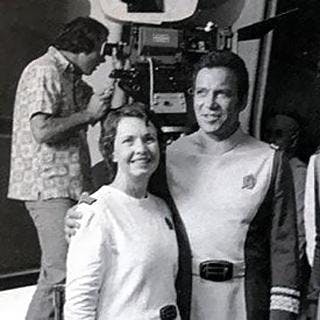
TrekClass, over the three semesters it has been taught, has only a 30%/70% split, female/male. Each class individually has a similar split, though there is a slow shift towards the more generous split of the fandom. Of course, these statistics are only representative of who enrolls in the class – the breakdown of who shows up regularly or who has better grades – and especially who contributes to our discussions is another story altogether!
FEMALE STEREOTYPES
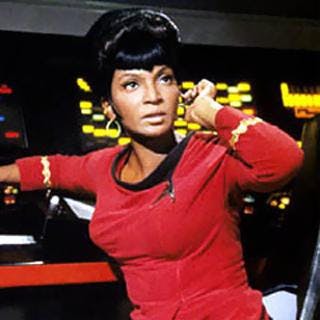
Now that we know about the women who love Star Trek, what about the women who are in Star Trek? In this case, context is everything.
The Original Series may have had loftier goals when it came to its portrayal of female crew members (a female second officer, for starters), but history does leave us with the groundbreaking Uhura on the Enterprise bridge. Today she’d barely cross our radars as anything more than an un-glorified secretary, but at the time she was unimaginable, due to both her gender and her race.
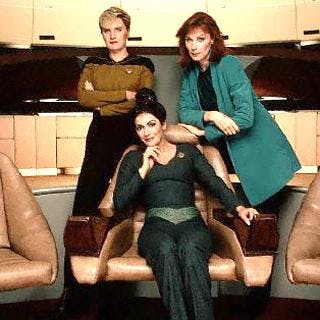
The Next Generation sees more females on board with Yar, Crusher and Troi all taking seats on the bridge at one time or another. Again, by today’s standards they’re at best overly emotional (Troi) caretaker (Crusher and Troi) types, or a reactionary product of their violent culture (Yar). Still, they are ahead of their time, and they definitely have more opportunities to expand their characters than Uhura was given, and over time they become more than their job descriptions.
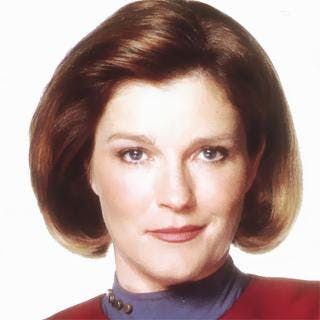
The women, usually in some type of command position, are rarely without agency and autonomy. They are far from the troublesome stereotypes found in other media, and this alone puts them light-years ahead of their counterparts in other series. But are they there yet?
THE BECHDEL TEST
This is a tool for testing movies, of which the Star Trek franchise offers us several. To pass, a movie must have (1) two or more female characters that both have names (2) that talk to each other (3) about something besides a guy. It’s astonishing how many movies fail this test, regardless of when they were made. And no, the 2009 Star Trek does not pass. Many of the Star Trek films don’t.
As the Bechdel test is primarily a tool for movies, or non-serialized media, it becomes tricky when applying it to a series. Many individual episodes across the franchise may (and do) fail, but overall are there enough female interactions meeting this criteria that we can say without thinking that it passes? Most likely.
However, is this detrimental to Star Trek in terms of female fans? The ratings would say it isn’t. Compared to other male-dominated interests, a lack of portrayed female camaraderie is hardly the worst thing. While its inclusion would be preferred, what else is Star Trek doing so right that has so many women watching?
ROLE MODELS
The characters in Star Trek are more than their genders, races or species. They are more than their beliefs and orientations and alignments. They are greater than the sum of these things. They are complete and flawed and the embodiment of our own struggles. There is a role model for everyone among Star Trek, if you’re looking.
In TrekClass, we ask the students to choose one captain during their final project as the “best” captain, for whatever criteria they’ve determined to be most important. Breaking all preconceptions, Janeway finds the largest following among our male students, and our female students are split fairly evenly across Janeway, Picard and Kirk. The students find themselves drawn to leadership styles moreso than to the leader’s gender.
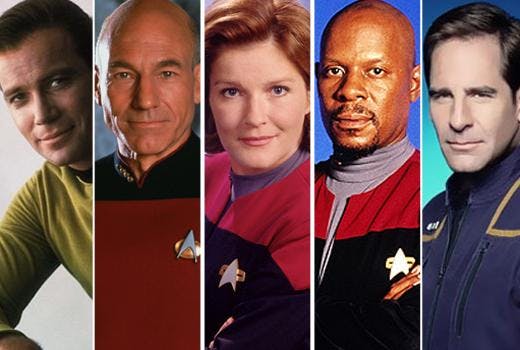
Class favorites across the board seem based on alienness (Data, Seven of Nine, Worf), spunk (Riker, Shelby, Dax), and humor. Gender issues rarely come up when we aren’t explicitly fishing for them in discussion, since we, and likely many fans, get absorbed in the universe and take for granted the fact that women are there.
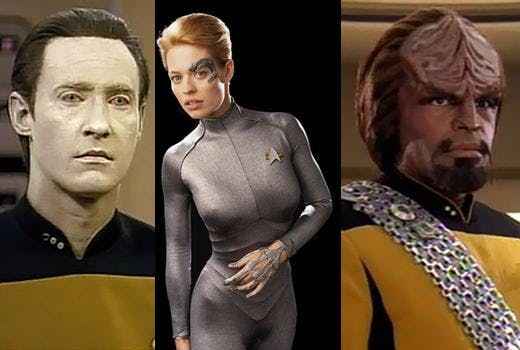
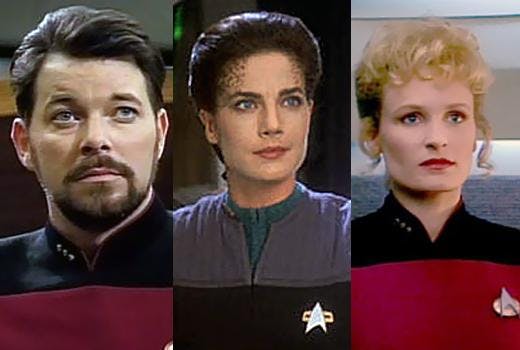
Star Trek isn’t alone in this attitude in the sci-fi bubble, though other “male-centric” franchises may want to take note and apply these lessons. Women are a part of these fandoms and subcultures – from video games to comic books - and we want to be here. Star Trek has shown us from the start that there is not only room for us, but also an integral place for us on the bridge. It’s time for other franchises to follow suit, and stop treating Geek Girls as an afterthought.
_______
Anthony Rotolo is a professor at the Syracuse University School of Information Studies (iSchool), where he specializes in social media. A new semester of Trek Class will begin meeting on August 28, and you can join the class discussion on Twitter every Tuesday and Thursday at 3:30 using the hashtag #TrekClass.

